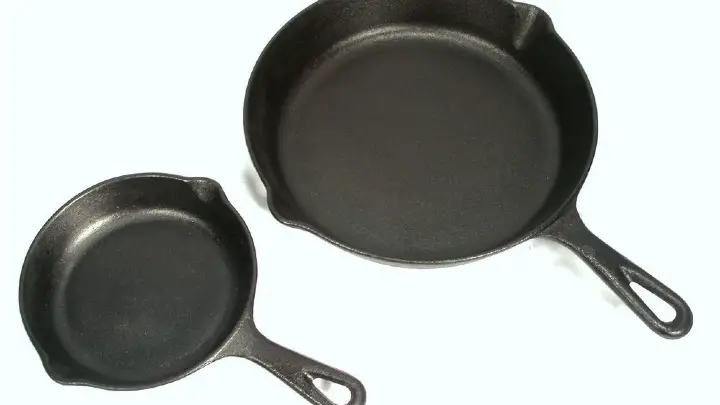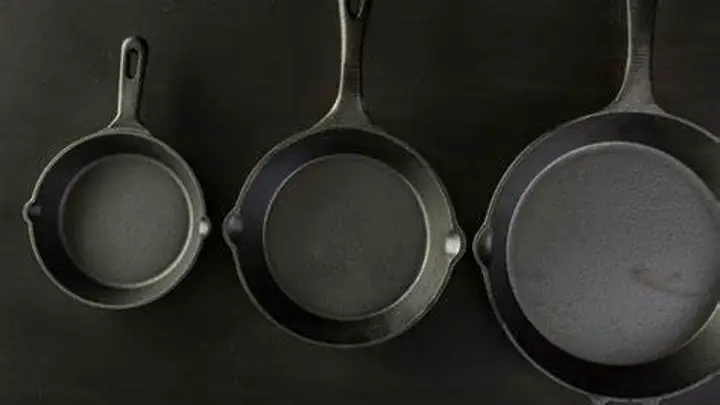If you cook often, you are likely familiar with cast iron pans and skillets. Are you, however, acquainted with hard nitriding cast iron?
These cast irons are not as popular as the regular cast irons you will find in the kitchen cabinet.
They are pretty unique in the cooking world, which is why you should read this article to learn what they are, what distinguishes hard nitriding cast iron, and why they are important in the kitchen.
SEE: Here Is How To Fix Uneven Seasoning In Cast Iron
What is a hard nitriding cast iron?

A hard nitriding cast iron is created through a cross-between casting and stamping process.
Molten steel is deposited into the lower half of a pan mold, where it is “infused” with other components to harden the surface and increase the life of the mold by reducing deformation.
Nitriding, also known as hard nitriding, is a heat treatment process that improves the rust durability and resistance of stainless steel.
It entails applying a nitrogen-rich gas, such as ammonia, or a solid, such as sodium cyanide, to heated metal.
Is hard nitriding cast iron good?
Yes, it is. Properly seasoned cast iron is a perfect method for protecting a cooking pan.
However, when you nitrate it, it makes it more durable, which also makes maintenance simpler. If you take good care of it, it can last a lifetime.
SEE: What is Crock Pot Warm Temperature?
How important is it to nitride cast iron cookware?
Your cast iron will last longer if it is nitrate. Additionally, because of the nitriding, the pan will require less maintenance.
Nonetheless, only a small number of cast iron varieties can be nitrogen-treated. Nitriding is, therefore, uncommon with cast iron cookware.
What are the benefits of nitrate cast iron for cooking?
Nitrate cast iron has a high level of rust resistance. Compared to conventional cast iron, it is also more non-stick.
Cast iron still needs to be seasoned to create a non-stick surface. However, food won’t adhere to your new pan when it is nitrate.
Cast iron that has been nitrate typically weighs less than regular cast iron, making cooking with it simpler.
SEE: Tips To Make Your Kitchen Appliances Last Longer
Does hard nitriding cast iron need to be seasoned?
Yes, it does. Even though nitrate has a high level of rust resistance, your hard nitride cast iron requires a little seasoning here and there.
How to season hard nitriding cast iron
Both traditional cast iron and hard nitriding cast iron require the same amount of seasoning.
1. Ensure that the pan is dry and spotless. It ought to be prepared for seasoning right out of the box.
2. Set your stovetop to medium heat and add one or two drops of oil to the pan, about the magnitude of a quarter.
3. Apply the oil to the pan’s exterior and interior using a dish towel. When doing this, hold the pan by its handle, after which you set it on the stovetop to heat.
4. Until the pan is dry, continue to rub the oil on and in the pan.
5. To reinforce the oil layer, repeat this procedure one to two more times.
SEE: Get a Chance to Win a $100 Family Dollar Gift Card
How do you remove black residue from hard nitriding cast iron?
To remove all of the black residues from your pan:
- Take out the leftover grains that may have stuck to the pan to prevent rusting, then apply a light coat of oil.
- With a stiff brush at hand, soak your pan in water for about an hour.
- Scrub with your brush, if necessary, using a small amount of soap.
- Dry with a towel, then place over a stovetop on a high heat setting.
SEE: Visit GetGo Store and Receive 10 Perks Bonus
FAQs
Where can you buy a hard nitriding cast iron?
Because they are uncommon and one-of-a-kind, you may need to do market research and comparison shopping at various online stores before buying your nitrate pan.
Does nitriding prevent rust?
Yes, it does. Nitriding, among the most important and widely used surface treatment processes, can improve the surface corrosion resistance of steel parts, improve durability, and slow down rusting.
SEE: Win Instant $25 or Grand Prize of a $1500 Gift Card at Target
Does nitride steel rust?
Yes, it rusts. However, it is far more rust-resistant than untreated stainless steel.
Does nitriding add thickness to cast iron?
Yes, it does. However, the thickness varies according to the nitriding process employed, the length of the treatment, and the boiler temperature. It also depends on the chemistry and structural makeup of the steel itself.
The metal becomes more robust and highly corrosive because of the added thickness, but there are no other advantages or disadvantages.
SEE: Stand a Chance to Win $1,000 Gift Card Big Lots
Conclusion
Even though it is uncommon, hard nitriding cast iron should be your first choice if you want to enjoy your pan for a long time. Furthermore, having nitrate pans means that rusting is pushed back further, as opposed to regular cast iron.
In addition, your cast iron will be nonstick and easy to clean. They may also be lightweight, depending on the nitriding process that the steel underwent.
The only disadvantage of nitriding pans is that they are not as widely available as other cast irons and skillets. However, if you are determined to obtain yours, you can start by checking online stores, then proceed to your local stores to inquire if they are available.
Thanks for reading.
You can also get more helpful guides here on Cheffist.






